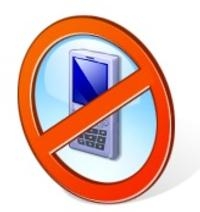Sat, Sep 08, 2012
Places The Burden For Their Ban In The U.S. On The FCC
As part of the FAA re-authorization bill passed by the congress earlier this year, Congress directed the Administrator of the FAA to conduct a study on the impact of the use of cell phones for voice communications in an aircraft during a flight in scheduled passenger air transportation. The agency was told to include a review of foreign government and air carrier policies on the use of cell phones during flight; a review of the extent to which passengers use cell phones for voice communications during flight; and a summary of any impacts of cell phone use during flight on safety, the quality of the flight experience of passengers, and flight attendants.

In its report, which the FAA released this week, the agency said that FCC regulations currently prohibit use of certain cellular telephones while airborne, and because of that, the FAA has not approved installation of on-board cellular telephone base stations, often called pico-cells, on US air carrier aircraft.
The FAA did identify several countries which do allow the use of cell phones on board airliners. The agency developed a questionnaire and sent it to those civil aviation authorities which allow their use. Those which responded included Australia, Brazil, France, Ireland, Jordan, Malaysia, New Zealand, Portugal, Saudi Arabia, the UAE, and the UK. The civil aviation authorities that responded said that there have been no confirmed occurrences of cell phones affecting flight safety on aircraft with on-board cellular telephone base stations. They also reported no cases of "air rage" or flight attendant interference related to passengers using cell phones on aircraft equipped with on-board cellular telephone base stations. Some passengers complained about the cost of the cell phone service, and when the cell phone service was inoperative or interrupted in flight.
The non-US civil aviation authorities who have approved the installation of onboard cellular telephone base stations on aircraft reported that the aircraft with these installations undergo extensive analysis, functional tests, ground tests, and flight tests to demonstrate that the cell phones and base stations do not interfere with aircraft systems. These aviation authorities reported that use of cell phones on aircraft while airborne is restricted by telecommunications authority regulations. Operators of aircraft with on-board cellular telephone base stations must have approval from telecommunication authorities before these systems can be used by passengers with their cell phones.
More News
Decision Altitude (DA) A specified altitude (mean sea level (MSL)) on an instrument approach procedure (ILS, GLS, vertically guided RNAV) at which the pilot must decide whether to >[...]
Aero Linx: T-34 Association, Inc. The T-34 Association was formed in July 1975 so that individuals purchasing then military surplus T-34As had an organization which would provide s>[...]
As He Released The Brakes To Begin Taxiing, The Brake Pedals Went To The Floor With No Braking Action Analysis: The pilot reported that during engine start up, he applied the brake>[...]
“Legislation like the Mental Health in Aviation Act is still imperative to hold the FAA accountable for the changes they clearly acknowledge need to be made... We cannot wait>[...]
Also: IAE Acquires Diamond Trainers, Army Drones, FedEx Pilots Warning, DA62 MPP To Dresden Tech Uni The danger to the flight training industry and our future pilots is clear. Dona>[...]
 ANN's Daily Aero-Term (12.08.25): Decision Altitude (DA)
ANN's Daily Aero-Term (12.08.25): Decision Altitude (DA) ANN's Daily Aero-Linx (12.08.25)
ANN's Daily Aero-Linx (12.08.25) NTSB Final Report: Piper PA-31T3
NTSB Final Report: Piper PA-31T3 Aero-News: Quote of the Day (12.08.25)
Aero-News: Quote of the Day (12.08.25) Airborne-Flight Training 12.04.25: Ldg Fee Danger, Av Mental Health, PC-7 MKX
Airborne-Flight Training 12.04.25: Ldg Fee Danger, Av Mental Health, PC-7 MKX



